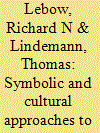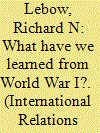| Srl | Item |
| 1 |
ID:
134465


|
|
|
|
|
| Summary/Abstract |
In this article, I describe Karl Deutsch’s personal and political background and career and offer an assessment of him as a scholar, teacher, and mentor.
|
|
|
|
|
|
|
|
|
|
|
|
|
|
|
|
| 2 |
ID:
132919


|
|
|
|
|
| Publication |
2014.
|
| Summary/Abstract |
This forum offers a symbolic and cultural approach for understanding the outbreak of World War I that stresses the interactional and symbolic-cultural aspects of German decision makers' brinkmanship during the July crisis of 1914. Contrary to excessive structuralist accounts, the contributions focus on what actors 'do' and 'feel' during a crisis. In the German-Austrian case, symbolic interactions during the July crisis were strongly marked by challenges to the 'face' of decision makers. The second theme of the Forum is to question the purely 'material' nature of those structures traditionally referred to as permissive for World War I. Structures, in fact, are symbolic, too. Like theories on status discrepancy, the Forum stresses the impact of 'responsibility gaps'. However, the contributors also point to the emotional aspects and internal legitimacy problems caused precisely by those status lags.
|
|
|
|
|
|
|
|
|
|
|
|
|
|
|
|
| 3 |
ID:
132920


|
|
|
|
|
| Publication |
2014.
|
| Summary/Abstract |
World War I has an important and complex relationship with international relations (IR) theory. The War was the catalyst for the emergence of IR as a discipline and helped to shape the liberal and realist paradigms. The War was also a principal focus of many IR theories. Realists and liberals based theories on it or justified them by arguing that they could account for its origins. Finally, the War influenced theory development in these and other paradigms through new understandings of it developed by historians. These interpretations in turn were often driven by contemporary political problems and projects. Theory, World War I, and the contemporary world are accordingly linked in direct and indirect ways. I cannot possibly unpack this relationship in a short essay. Rather, I want to illustrate with a few examples of the way in which contemporary political events and intellectual developments have encouraged new understandings of World War I. That conflict emerges as a resource, but one used in so many ways that it increasingly comes to resemble a Rorschach Test.
|
|
|
|
|
|
|
|
|
|
|
|
|
|
|
|